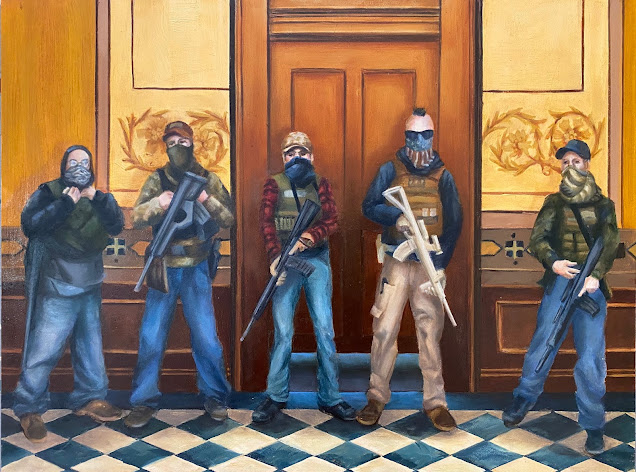Gratitude
12x16 oil on panel
coronavirus series
We tend to focus on things that worry us or need changing. By giving attention to problems we can decide how best to make improvements. However sometimes this drive to root out problems makes us less aware of what is good or even great in our lives and in the world.
In the midst of the fearful rollercoaster ride that the pandemic has forced the whole world on we have seen kindness, selflessness and caring on levels that bring me to tears. When quarantine orders drove most people home, there were legions of “essential workers” who ensured that we had the care, supplies and services we needed. Healthcare professionals, grocery, retail and food service workers, janitors and maids, transportation workers, gas station attendants and mechanics, postal employees, delivery drivers, grocery store employees and countless more put themselves at risk by interacting with large numbers of people daily. Essential workers, often not granted the privilege to isolate, made social distancing possible for the majority.
Expressions of gratitude bubbled up around the globe. Red Cross volunteers picked thousands of flowers to give to healthcare workers in Italy, The US Air Force Thunderbirds conducted flyovers in many US cities, the statue of Christ the Redeemer who overlooks Rio de Janeiro was illuminated with a stethoscope draped around his neck, and the Eiffel Tower bore “MERCI” in lights while Michelin starred chefs made meals for employees of Parisian hospitals.
Between 6:00 and 7:00 PM, the most common period for a change of shifts, New York City rang with applause as people opened their windows, stepped onto balconies or fire escapes and clapped, banged pots and pans and chanted their thanks. People in Italy, India and Spain offered similar tributes.
Unable to directly thank all those willing to sacrifice their own safety and well being in this global crisis, people found other ways to express themselves. Home made signs appeared in windows and on lawns, chalk spelled out thanks on sidewalks, and chain link fences became galleries of grateful messages. Throughout the country and around the world groups of people stood on random corners or in parks and simply held a message of appreciation and gratitude over their head.
Yup, I’m crying again.






